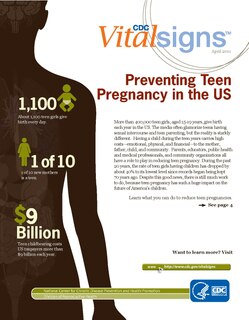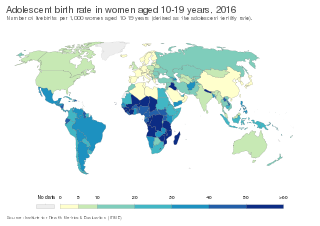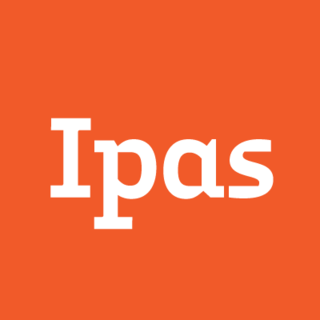
Teenage pregnancy, also known as adolescent pregnancy, is pregnancy in a female under the age of 20, according to the WHO. Pregnancy can occur with sexual intercourse after the start of ovulation, which can be before the first menstrual period (menarche) but usually occurs after the onset of periods. In well-nourished girls, the first period usually takes place around the age of 12 or 13.

Family planning is "the ability of individuals and couples to anticipate and attain their desired number of children and the spacing and timing of their births. It is achieved through use of contraceptive methods and the treatment of involuntary infertility." Family planning may involve consideration of the number of children a woman wishes to have, including the choice to have no children and the age at which she wishes to have them. These matters are influenced by external factors such as marital situation, career considerations, financial position, and any disabilities that may affect their ability to have children and raise them. If sexually active, family planning may involve the use of contraception and other techniques to control the timing of reproduction.
Reproductive rights are legal rights and freedoms relating to reproduction and reproductive health that vary amongst countries around the world. The World Health Organization defines reproductive rights as follows:
Reproductive rights rest on the recognition of the basic right of all couples and individuals to decide freely and responsibly the number, spacing and timing of their children and to have the information and means to do so, and the right to attain the highest standard of sexual and reproductive health. They also include the right of all to make decisions concerning reproduction free of discrimination, coercion and violence.

Sexual and reproductive health (SRH) is a field of research, healthcare, and social activism that explores the health of an individual's reproductive system and sexual wellbeing during all stages of their life.
Adolescent medicine also known as adolescent and young adult medicine is a medical subspecialty that focuses on care of patients who are in the adolescent period of development. This period begins at puberty and lasts until growth has stopped, at which time adulthood begins. Typically, patients in this age range will be in the last years of middle school up until college graduation. In developed nations, the psychosocial period of adolescence is extended both by an earlier start, as the onset of puberty begins earlier, and a later end, as patients require more years of education or training before they reach economic independence from their parents.
The sexuality of US adolescents includes their feelings, behaviors and development, and the place adolescent sexuality has in American society, including the response of the government, educators, parents, and other interested groups.
The Women's Refugee Commission is a 501(c)(3) nongovernmental organization that aims to improve the lives and protects the rights of women, children, and youth displaced by conflict and crisis. Established in 1989 by Liv Ullmann and others, it was part of the International Rescue Committee (IRC) until 2014.

Industrialized and developing countries have distinctly different rates of teenage pregnancy. In developed regions, such as United States, Canada, Western Europe, Australia, and New Zealand, teen parents tend to be unmarried, and adolescent pregnancy is seen as a social issue.

Reproductive justice is "the human right to maintain personal bodily autonomy, have children, not have children, and parent the children we have in safe and sustainable communities," according to SisterSong Women of Color Reproductive Justice Collective, the first organization founded to build a reproductive justice movement. In 1997, 16 women-of-color-led organizations representing four communities of color – Native American, Latin American, African American, and Asian American – launched the nonprofit SisterSong to build a national reproductive justice movement. Additional organizations began to form or reorganize themselves as reproductive justice organizations starting in the early 2000s.
Advocates for Youth is a nonprofit organization and advocacy group based in Washington, D.C., United States, dedicated to sexuality education, the prevention of HIV and of sexually transmitted disease, teenage pregnancy prevention, youth access to condoms and contraception, equality for LGBT youth, and youth participation. In addition, Advocates for Youth sponsors media campaigns and other forms of outreach which attempt to change societal norms to be more understanding of, accepting, of, and responsible about youth sexuality.
National Network for Youth (NN4Y) was founded in 1974 as the National Network of Runaway and Youth Services (NNRYS). Back then, NNRYS was the membership association of community-based organizations that had emerged in the 1970s to focus on the needs of youth in runaway and homeless situations. Today, NN4Y represents more than 500 community-based organizations that provide an array of services to youth and families in the United States and territories. NN4Y members work with their neighborhood youth, adults, associations, and regional and state networks of youth workers to provide street-based services, emergency shelter, transitional living programs, counseling, and social, health, educational and job-related services to over 2.5 million youth each year.

Ipas is an international, non-governmental organization that increases access to safe abortions and contraception. To this end the organization informs women how to obtain safe and legal abortions and trains relevant partners in Africa, Asia, and Latin America on how to provide and advocate for these.
Pregnancy when coupled with domestic violence is a form of intimate partner violence (IPV) where health risks may be amplified. Abuse during pregnancy, whether physical, verbal or emotional, produces many adverse physical and psychological effects for both the mother and fetus. Domestic violence during pregnancy is categorized as abusive behavior towards a pregnant woman, where the pattern of abuse can often change in terms of severity and frequency of violence. Abuse may be a long-standing problem in a relationship that continues after a woman becomes pregnant or it may commence in pregnancy. Although female-to-male partner violence occurs in these settings, the overwhelming form of domestic violence is perpetrated by men against women. Pregnancy provides a unique opportunity for healthcare workers to screen women for domestic violence though a recent review found that the best way in which to do this is unclear. Reducing domestic violence in pregnancy should improve outcomes for mothers and babies though more good quality studies are needed to work out effective ways of screening pregnant women.
A Sex education curriculum is a sex education program encompassing the methods, materials, and assessments exercised to inform individuals of the issues relating to human sexuality, including human sexual anatomy, sexual reproduction, sexual intercourse, reproductive health, emotional relations, reproductive rights and responsibilities, abstinence, birth control, and other aspects of human sexual behavior. Common sex education curricula include an abstinence-only approach, as well as a comprehensive approach, implemented in academia via the Internet, peer education, visual media, games, health care organizations, and school instruction.
Reproductive coercion is a collection of behaviors that interfere with decision-making related to reproductive health. These behaviors are meant to maintain power and control related to reproductive health by a current, former, or hopeful intimate or romantic partner, but they can also be perpetrated by parents or in-laws. Coercive behaviors infringe on individuals' reproductive rights and reduce their reproductive autonomy.
Sexual and reproductive health and rights or SRHR is the concept of human rights applied to sexuality and reproduction. It is a combination of four fields that in some contexts are more or less distinct from each other, but less so or not at all in other contexts. These four fields are sexual health, sexual rights, reproductive health and reproductive rights. In the concept of SRHR, these four fields are treated as separate but inherently intertwined.

Teenage pregnancy in the United States refers to females under the age of 20 who become pregnant. 89% of these births take place out-of-wedlock. Since the 2010s, teen pregnancy rates have declined almost continuously but The United States has one of the highest teenage birth rates among the industrialized nations. According to the Centers for Disease Control, evidence suggests that the decline in teenage pregnancy is due to abstinence teaching and the use of birth control. Although the decline is considered good news, the racial/ethnic and geographic disparities continue in The United States.
Rutgers WPF Indonesia is the Indonesian branch of Rutgers WPF, an international centre of expertise on Sexual and Reproductive Health and Rights (SRHR) founded and based in the Netherlands. The Indonesian branch was established in 2007, founded under the name "WPF". Rutgers WPF is the result of the merger between the World Population Foundation (WPF) and Rutgers Nisso Groep, a Dutch Expert Centre on Sexuality in 2010. Rutgers WPF focuses on improving sexual and reproductive health and the acceptance of sexual rights and gender equality in developing countries across Europe, Africa and Asia. Since 2009, the organization had been headed internationally by executive director Dianda Veldman and by Monique Soesman in Jakarta, Indonesia since 2014.
Teenage pregnancy is a girl between the ages of 13 and 19 becoming pregnant. The term used in every day speech usually refers to girls who have not yet reached legal adulthood, which in Australia is anyone under the age of 18. At the national level, the teenage birth rate has declined in the last decade. The rate was about 16 babies per 1,000 women aged 15–19 years between 2011 and 2012 but this had fallen to 11.9 births per 1,000 women aged 15–19 in 2015, the lowest figure on record. Terminations can be performed up until the 12-week mark. About half of all teenage pregnancies are terminated in Australia.
The SisterSong Women of Color Reproductive Justice Collective, also known as SisterSong, is a national activist organization dedicated to reproductive justice for women of color. The non-profit defines reproductive justice as the human right to maintain personal bodily autonomy, have children, not have children, and parent the children we have in safe and sustainable communities.






